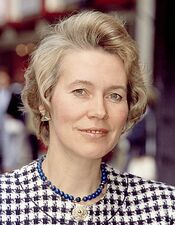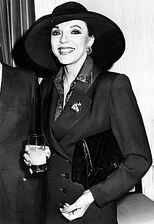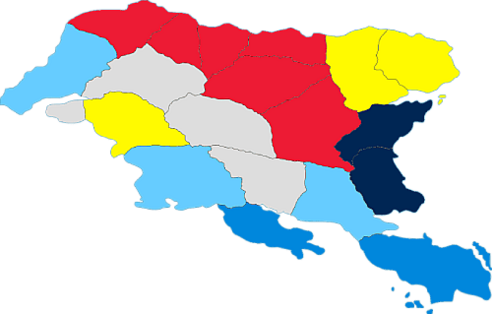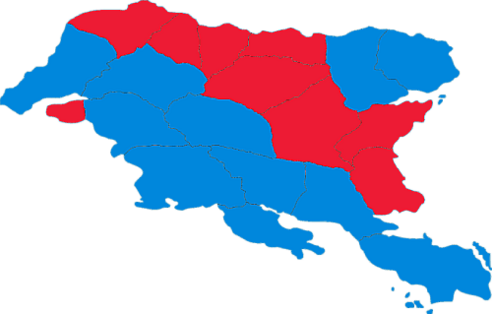Gylian presidential election, 1986
| |||||||||||||||||
| Turnout | 93,7% | ||||||||||||||||
|---|---|---|---|---|---|---|---|---|---|---|---|---|---|---|---|---|---|
| |||||||||||||||||
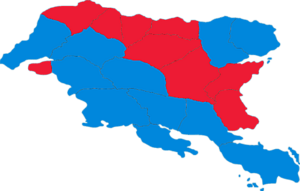 | |||||||||||||||||
| |||||||||||||||||
Presidential elections were held in Gylias on 22 January 1986.
National Bloc candidate Sáe Nyran narrowly defeated Progressive Alliance candidate Gianna Calderara, with the narrowest winning margin of a Gylian presidential election. The election was affected by the wretched decade and particularly the failure of the hung parliament elected in 1985 to designate a new Prime Minister.
Procedure
The election was held through instant-runoff voting.
Candidates were registered with Elections Gylias in accordance with normal procedures. They could either be nominated by a political party or electoral bloc, civic organisations, or self-nomination as independents.
Candidates
| Candidate | Nominator | Office(s) held | Details | ||
|---|---|---|---|---|---|
| Sáe Nyran | 
|
National Bloc | None | Campaigned as the main conservative candidate. | |
| Gianna Calderara | 
|
Progressive Alliance | None | Campaigned as the main leftist candidate. | |
| Phaedra Metaxa | 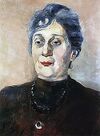
|
Independent | Senator for Elena (since 1962) |
Campaigned on promotion of the arts and culture. | |
| Electra Galanou | 
|
Union for a New Republic | Chief executive of Omicron Group (since 1961) |
Campaigned on promotion of economic nationalism and disability rights. | |
| Clarissa Rossetti | 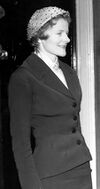
|
Liberal Union | Minister of Equality and Integration (1958–1976) Senator for Arxaþ (since 1962) |
Campaigned as the main liberal candidate. | |
| Françoise Chatelain | 
|
OMFLG–ACFEN | None | Campaigned on promotion of francité. | |
| Luiza Monteira | 
|
Centre of Constitutional Monarchists | Deputy for Ḑarna (since 1980) |
Campaigned on promotion of monarchism. | |
Results
| Candidate | Nominator | First count | % | Final count | % | |
|---|---|---|---|---|---|---|
| Sáe Nyran | NB | 1.464.935 | 16,4% | 4.038.312 | 50,0% | |
| Gianna Calderara | PA | 1.456.003 | 16,3% | 4.036.697 | 50,0% | |
| Phaedra Metaxa | Independent | 1.447.070 | 16,2% | |||
| Electra Galanou | UNR | 1.438.138 | 16,1% | |||
| Clarissa Rossetti | LU | 1.429.205 | 16,0% | |||
| Françoise Chatelain | OMFLG–ACFEN | 1.000.444 | 11,2% | |||
| Luiza Monteira | CCM | 518.087 | 5,8% | |||
| Others/write-ins | 178.651 | 2,0% | ||||
| Total | 8.932.532 | 100% | 8.075.009 | 100% | ||
| Registered voters and turnout | 9.619.695 | 93,7% | ||||
Maps
Analysis
The election was held in the shadow of the 1985 federal election, which had produced a hung parliament that was yet to nominate a new Prime Minister. How to overcome the nadir of the wretched decade thus became the prominent theme of the campaign, with all candidates giving their ideas how to resolve the parliamentary deadlock.
With incumbent President Len Resis choosing not to run for re-election, the Liberal Union sought to recruit a major candidate, encouraged by its victory in the previous presidential election. They settled on Senator Clarissa Rossetti, formerly the equality minister in the Darnan Cyras government and matriarch of the prestigious Rossetti family. Although Clarissa had turned down overtures to run for the National Unity Party leadership, she agreed to run for the presidency as it carried less pressure.
The Progressive Alliance's fortunes had improved since it was expelled from the Aén Ďanez government in 1983, but its underperformance in 1985 showed it was still damaged in the eyes of voters due to said participation. It also chose a revered figure from the Golden Revolution as its candidate: Gianna Calderara, Darnan Cyras' spouse and activist. Meanwhile, the National Bloc was confident on account of its plurality victory in 1985, and it nominated social scientist and activist Sáe Nyran as its candidate.
Businesswoman and inventor Electra Galanou announced she would be running for the presidency, and secured the endorsement of the Union for a New Republic, the first time that a UNR candidate would be on the ballot. Electra's campaign was noteworthy for taking disability rights as its main focus, and for campaigning in the mountainous north, where she proclaimed her staunch conservatism and economic nationalism. The election was rounded out by poet and Senator Phaedra Metaxa, who ran as an independent, promising to "heal the nation" and make poetry "the foundation of public life".
The first count became the closest Gylian presidential election in history, with 5 candidates separated by only 35.000 first preference votes. Sáe won a plurality with 16,4% of first preference votes, Gianna finishing second. Phaedra finished third, Electra finished fourth, and Clarissa finished fifth, although her 16% of first preference votes ironically bettered her mother's performance in 1961.
The closeness of the result was visible on the first round map. Sáe only won pluralities in two regions — Nerveiík-Iárus-Daláyk and Nauras. Clarissa won pluralities in the liberal strongholds of Arxaþ, Alţira, and Elena. Both Phaedra and Electra won pluralities in relatively disparate regions, while Gianna won pluralities in the north and narrowly carried Mişeyáke by only 2.000 more first preference votes than Phaedra. One surprise of the election was the dramatic improvement of perennial candidates Françoise Chatelain and Luiza Monteira. Françoise surpassed 1 million first preference votes for the first time, and won pluralities in Nezyál and Herlan.
The contest remained close into the final round, where Sáe defeated Gianna by only 1.615 votes, the narrowest margin of a Gylian presidential election. Sáe mainly benefited from transfers from Electra, Phaedra, and Luiza's voters, while Gianna overwhelmingly won transfers from Françoise and Clarissa's voters. Analysts found any number of factors that could've changed the final result, ranging from the number of exhausted ballots to the proportion of write-in votes.
The final map reflected the razor-thin result: Sáe won majorities in 11 out of 20 regions, and Gianna in the remaining 9. The contest in Tandar was especially close, and Gianna believed that the decisive factor in her loss was failing to carry it. The electorate was so closely divided that neither Sáe nor Gianna won majorities larger than 1% in any region. Sáe acknowledged the narrow result in her victory speech, declaring, "I promise I will do my best to earn your trust."
The election laid the foundation for Gianna's victory five years later, while Electra's strong third place finish demonstrated that the candidacy of a charismatic businesswoman was viable, paving the way for Mielikki Salonen to establish the New Alliance for the Future.
